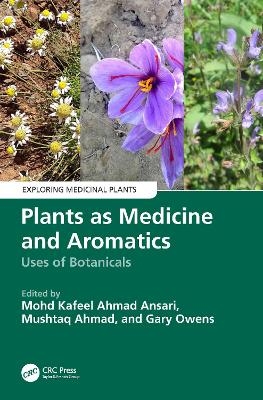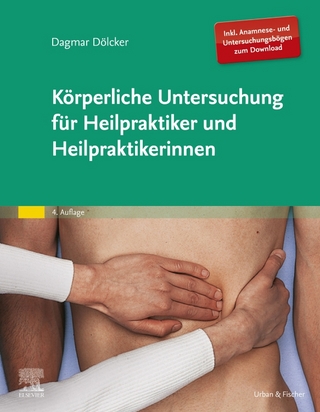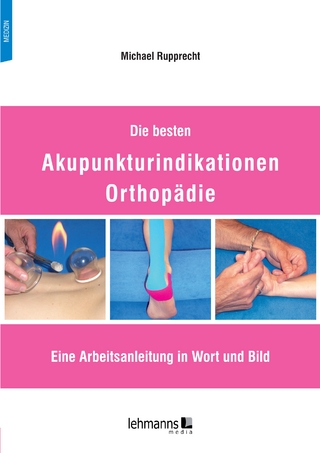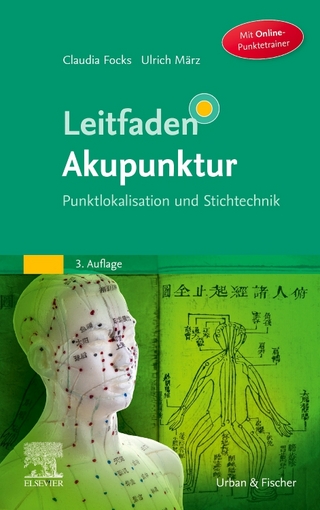
Plants as Medicine and Aromatics
CRC Press (Verlag)
978-1-032-51790-2 (ISBN)
Plant‑based medicines and aromatics are increasingly in demand in the healthcare sector all over the globe where they are used, not only for the treatment of various diseases, but also for maintaining good human health. Plants as Medicine and Aromatics: Uses of Botanicals reviews modern uses of ancient botanicals as medicine and aromatics, including chapters on both traditional usage and modern drug discovery development, as well as clinical research and development in ancient medicinal herbs.
Features:
Assesses the status of aromatics and medicinal plants as well as their modern uses.
Elucidates the uses of plants within traditional culture practices for the prevention and treatment of diseases.
Examines contemporary approaches being used to explore medicinal botany.
A volume in the Exploring Medicinal Plants series, Plants as Medicine and Aromatics: Uses of Botanicals presents a comprehensive understanding in terms of modern uses of botanicals of medicinal and aromatic plants. It is useful to researchers, teachers, cultivators, students, and for those interested in herbal medicine.
Dr. Mohd Kafeel Ahmad Ansari earned his PhD degree from the Department of Botany, School of Chemical and Life Sciences, Jamia Hamdard University, New Delhi, India. He is currently serving as an Associate Professor of Biology at the University of Guyana, Georgetown, South America. He received prestigious Endeavour Postdoctoral Research Fellowship Award from Government of Australia, a Foreign Citizen Research Fellowship Award from the Government of Turkey, and Dr. D.S. Kothari Research Fellowship Award, Government of India. He also received many other National and International Awards for Excellence in Higher Education, International Scientist Award and Best Teacher Appreciation Award in recognition of his outstanding contributions in the field of plant sciences. He has worked as Visiting Scientist at the University of South Australia, Adelaide, Australia, in the Department of Biology, Anadolu University, Turkey and at the Department of Biosciences, Jamia Millia Islamia (Central University), New Delhi, India. He was associated with SP University, India as Associate Professor of Botany. Also he served as Australian Awards Ambassador for higher educational institutions of India. He has more than 14 years of teaching and research experience in plant eco-physiology, plant stress physiology, industrial and environmental biotechnology, environmental microbiology, microbial genetics, microbiology, molecular biology, aromatics and medicinal plants, plant-microbe-soil interactions and phytoremediation technology as well as cyanobacterial research. He has published over 35 research papers in peer-reviewed international journals, edited as main editor 02 books with Taylor & Francis, USA, authored 10 book chapters, co-authored many book chapters, and currently editing 03 books with international publishers, including Springer Nature, and CRC Press (Taylor & Francis Group) etc. He has been supervised many research students at national and international level. He has received several grants for his international research projects. He severed as member of Departmental Research Committee, Academic Council, Board of Research Studies, Faculty Board, Faculty Representative and Advisory Board for Graduate Studies and Research at various universities of the world. He has been engaging with several professional memberships of India, Italy, Germany, Hong-Kong, Japan and USA. He has attended various national and international conferences and invited talk. Due to his diverse expertise in interdisciplinary research, he has in a high demand as an external thesis examiner worldwide. He also figured in various Scientific Committees globally and also placed in AD Scientific index. At present, he is serving as member of many editorial boards and reviewer of a number of high impacts international scientific journals. He has been involved with international and multidisciplinary research projects globally. Professor Dr. Mushtaq Ahmad is currently working as Director QAU Botanical Garden and Herbarium (ISL), Director Technology Science Park (QAU) and Chairman Department of Plant Sciences, Faculty of Biological Sciences, Quaid-i- Azam University Islamabad. Prof. Dr. Ahmad has over 768 publications (citations ±13008, Hindex56, i10-index 294) in diverse fields of Plant Sciences including 694 research publications, 23 international books, 20 chapters in books published largely by Elsevier, Springer, Taylor & Francis, Wiley etc. across the world including Asia, Europe, USA and Africa. He has successfully supervised/produced 32 PhD, 100 M.Phil., 55 M.Sc.and 10 BS research scholars in advanced areas of Plant Systematics & Biodiversity. He has also been awarded various national and international awards in recognition of his outstanding contributions in the field of science and technology including Top 2% influential scientist of the World (2020); Young Research Scholar Award by HEC (2019); Highly Cited Research Paper Award by Elsevier and Willey (2019); Young scientist award by CAS – PIFI – China (2018),Young membership award by Pakistan Academy of Sciences, (2016); Productive scientist awards by PCST (2009 todate); TTS Performance based Awards (2010 to date); Post Doc. Fellowship by TWAS-Malaysia (2012); Best book award by HEC (2013); Best research paper award by HEC (2011); Gold Medal award by Pakistan Academy of Sciences (2011). He is the member of many international and national academic bodies. Prof. Ahmad has been awarded with many research grant projects funded by GBIF, BIFA (Japan-USA), NAS-USA, CAS-China, Mevlana-Turkey, PAS, HEC and TWAS. These research grants helped Prof. Ahmad to establish modern digital Herbarium (ISL),Botanical Garden, Technology Science Park, Melissopalynology, Aerobiology, Nutraceutical and Green Biofuelresearch laboratories. He has organized 12 and attended 75 International/National Conferences as Keynotespeaker. He has been hosted a series of TV programs and YouTube Channel (Miracle Herbal Diversity) to awareGlobal and Pakistani communities, farmers linkages with academia and industries to use plant biodiversity for socioeconomic uplifting. He is the active advisory board member in flora of PAN-Himalaya (Asia) & also contributor for medicinal plants naming (MPN), Kew-UK, IUCN member and PAS member. He is the recognized reviewer and editorial board member of many world reputed ISI Journals and Book series. He is the expert member of DTRC, Selection Board, Board of Studies and Examiner in different universities and institutions in the country. Dr. Gary Owens has completed undergraduate, graduate and Doctorate (1996) from the University of Adelaide, Australia. He worked with CSIRO-2001, Australia and CERAR-2003, UniSA, Australia. Dr. Gary also served as Program Director in 2007 at UniSA. Since 2013, Gary has been serving as Group leader of ECG, Future Industries Institute, UniSA, Australia. He has a broad multidisciplinary background with more than 26 years’ experience as an active teacher and researcher leading both international and multidisciplinary research projects touching all facets of plant science, environmental science and engineering. His research focus is on medicine plants, engineered nanomaterials, plant stress physiology, phytoremediation and heavy metal bioavailability, speciation and computer modeling. Dr. Gary has published 147 research papers in peer reviewed international journals on plant stress physiology, phytoremediation, and cyanobacterial laccase. He is member of royal Australian chemical institute, The Australian nanotechnology network. He is reviewer of many international scientific journals worldwide.
An overview of present status of medicinal, aromatics plants and their modern uses. Ethnobotanical knowledge on medicinal and aromatic plants from Kashmir Himalayas. Aromatic and medicinal plants for the treatment of lice and scabies and impact as post-disaster. Folkloric plants as the potential cancer chemopreventive agents. Use of Golden Spice Turmeric, Pharmacological effects of Polyphenolic Curcumin in Disease Prevention and Treatment. Evaluation of the antimicrobial efficacy of citrus fruits against bacterial diseases. Promising development of essential oils as potential therapeutic agents. Traditional and modern health uses of Cannabis sativa L. Phytochemistry and neuroprotective spectrum of a medicinal food product: Crocus sativus Linn. Mıracle plants of Turkey: theır use ın tradıtıonal as well as modern medicine. Garlic vine species: Phytochemical, pharmacological, and toxicological properties. Medicinal plants and emerging trends in biotechnology. Ancient medicinal plant prescriptions used in the Anatolian region of Mesopotamia. Herbal medicines as anti-microbial agents. Phytochemical characterization and evaluation of inhibitory activity of myrcia pubipetala essential oil on α-glucosidase enzyme. Citronella aromatic essential oil and its mosquito repellent properties. Medicinal bee pollen: Composition and therapeutic properties. Health Security of the Desert Community Using Aromatic and Medicinal Plants. Herbal wisdom through time: The evolution of medicinal plants utilization. Aromatic plants and biological applications. The use of medicinal and aromatic plants in beekeeping; Evaluation of sage in terms of beekeeping as a case study. Chemical profile and biological activities of hedyosmum brasielense essential oil for improved oral hygiene. Antioxidant properties of aromatics and medicinal plants.
| Erscheinungsdatum | 12.09.2024 |
|---|---|
| Reihe/Serie | Exploring Medicinal Plants |
| Zusatzinfo | 53 Tables, black and white; 54 Line drawings, black and white; 36 Halftones, black and white; 90 Illustrations, black and white |
| Verlagsort | London |
| Sprache | englisch |
| Maße | 178 x 254 mm |
| Gewicht | 997 g |
| Themenwelt | Sachbuch/Ratgeber ► Gesundheit / Leben / Psychologie ► Alternative Heilverfahren |
| Technik | |
| Weitere Fachgebiete ► Land- / Forstwirtschaft / Fischerei | |
| ISBN-10 | 1-032-51790-5 / 1032517905 |
| ISBN-13 | 978-1-032-51790-2 / 9781032517902 |
| Zustand | Neuware |
| Informationen gemäß Produktsicherheitsverordnung (GPSR) | |
| Haben Sie eine Frage zum Produkt? |
aus dem Bereich


